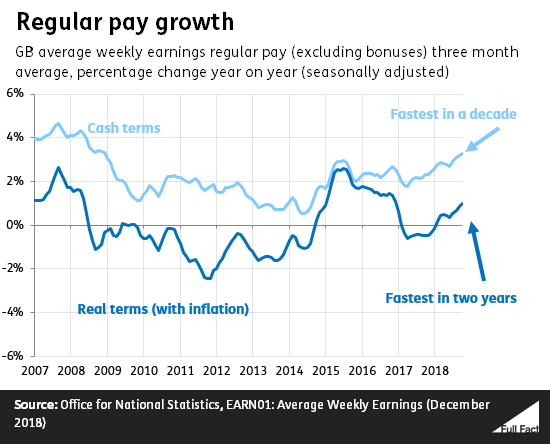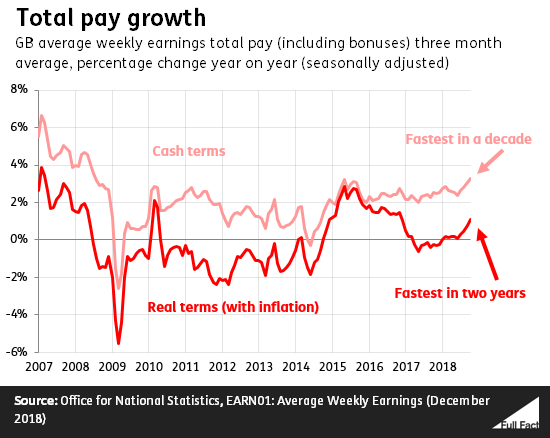What was claimed
Wages are rising at their fastest rate for a decade.
Our verdict
That’s correct but it doesn’t account for inflation. When you factor in rising prices, real wage growth is at its highest in two years.
What was claimed
Wages are rising at their fastest rate for a decade.
Our verdict
That’s correct but it doesn’t account for inflation. When you factor in rising prices, real wage growth is at its highest in two years.
“Wages rises accelerate to fastest pace since 2008”
BBC News, 11 December 2018
“UK workers get biggest pay rise in a decade”
Reuters, 11 December 2018
Headlines about the latest data on people’s earnings from the Office for National Statistics (ONS) are focusing on the claim that wages are rising at the fastest pace in a decade. But these ignore something important.
It’s correct—as you’ll read in several places—that average weekly wages in Great Britain are growing at their fastest rate since 2008, but only if you don’t adjust for inflation. The problem is that failing to adjust for inflation (the rise in how much things cost over time) can give a misleading impression of how these statistics reflect people’s lives.
If you want a more meaningful idea of how wages are changing, you need to take into account how prices are changing at the same time. What you take home from work is only as useful as what it will buy you.
We don’t have to look far to see how things look adjusted for inflation (what’s known as “real terms”, as opposed to “nominal” or “cash terms” for the non-adjusted figure), as the ONS says this clearly in their release:
Looking at annual growth rates for regular pay (excluding bonuses), between August to October 2017 and August to October 2018:
regular pay in nominal terms increased by 3.3%; the annual growth rate has not been higher since September to November 2008
regular pay in real terms increased by 1.0%, the annual growth rate has not been higher since October to December 2016
This means wage growth can look quite different depending on which measure you look at.

You can see the same effect if you look at “total pay” instead of “regular pay”, which includes how much people are paid in bonuses.

Whichever you look at, it’s true that pay packets are growing, and growing at a faster rate than they have in some time. But once you account for inflation, it doesn’t compare yet to the growth in 2015 and 2016, when inflation was low and real terms pay packets were increasing at a faster rate.
This matters because, as we’ve seen from several recent Prime Minister’s Questions, this is a headline claim used by the government, alongside correct claims about the employment rate being at a record high, and unemployment rates at their lowest in over 40 years.
But this view on wages simply doesn’t give the best picture of what’s happening to people’s pay.
Quoting the non-adjusted figure isn’t wrong; it is useful to know both the figure before and after adjusting for inflation. But at the very least news reports should say clearly that this is what they’re doing―and give the real terms figure alongside it.
Join 72,953 people who trust us to check the facts
Sign up to get weekly updates on politics, immigration, health and more.
Subscribe to weekly email newsletters from Full Fact for updates on politics, immigration, health and more. Our fact checks are free to read but not to produce, so you will also get occasional emails about fundraising and other ways you can help. You can unsubscribe at any time. For more information about how we use your data see our Privacy Policy.
We got in touch to request a correction regarding a claim made by Elizabeth Truss in Parliament.
They made a correction.
Full Fact fights for good, reliable information in the media, online, and in politics.
Bad information ruins lives. It promotes hate, damages people’s health, and hurts democracy. You deserve better.
Subscribe to weekly email newsletters from Full Fact for updates on politics, immigration, health and more. Our fact checks are free to read but not to produce, so you will also get occasional emails about fundraising and other ways you can help. You can unsubscribe at any time. For more information about how we use your data see our Privacy Policy.